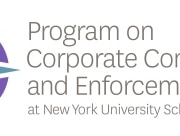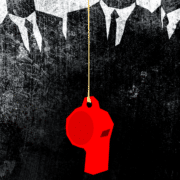Ethical Systems Files Amicus Brief in Defense of Internal Whistleblowers
This post originally appeared on The FCPA Blog. It is cross posted here.
 On November 28, 2017, the Supreme Court will hear arguments in Digital Realty Trust v. Paul Somers on the question of whether the whistleblower protections of the Dodd-Frank Act extend to internal whistleblowers, or only to those who report to the SEC.
On November 28, 2017, the Supreme Court will hear arguments in Digital Realty Trust v. Paul Somers on the question of whether the whistleblower protections of the Dodd-Frank Act extend to internal whistleblowers, or only to those who report to the SEC.
 Research shows that the majority of employees who report misconduct do so internally, through informal discussions with managers and other conduits. If the Court interprets the Act’s protections as extending only to those who provide information to the SEC, it could stymie and complicate the important work of ethics & compliance officers.
Research shows that the majority of employees who report misconduct do so internally, through informal discussions with managers and other conduits. If the Court interprets the Act’s protections as extending only to those who provide information to the SEC, it could stymie and complicate the important work of ethics & compliance officers.
One of the primary goals of most compliance programs is to create a speak-up culture in the organization, encouraging employees to voice their ethics concerns and observations of impropriety. It is the best way for companies to learn about misbehavior before the problem gets too big — and before it is reported externally, which could damage the organization’s reputation and stability.
Moreover, the Federal Sentencing Guidelines encourages cultivating an environment that supports the internal reports by employees, stating that organization’s “… take reasonable steps to have and publicize a system . . . whereby the organization’s employees and agents may report or seek guidance regarding potential or actual criminal conduct without fear of retaliation.”
Speaking-up in the workplace is among the most difficult decisions for employees. Most employees choose to not discuss noticed misbehavior. To overcome this reluctance, researchers recommend that organizations create internal cultures and environments that promote employee voice and dissent.Evidence shows that employees are most likely to report misconduct when they perceive that their supervisor supports them and that the organization is likely to be responsive to the complaint.
Some argue that the Sarbanes-Oxley Act (SOX) already provides protection for those who report internally. Empirical evidence shows a different story, however.
From the effective date of SOX until 2011, among those individuals who filed with the Occupational Safety and Health Administration (OSHA), as mandated by SOX for bringing whistleblower claims, employees won only 1.8 percent of all cases.
There are a myriad of factors contributing to this low success rate, including stalled administrative procedures and the burden of proof. These numbers raise the question of whether internal whistleblowers should trust the system.
Corporate anti-retaliation policies that are not backed-up with legal protections send mixed signals to employees, and that is likely to stifle speech.
What we know about ethical culture in organizations through Linda Trevino and Katherine Nelson’s research is that alignment between an organization’s actions and norms of behavior and its policies is of prime importance to reducing unethical behavior.
To advocate for this critical alignment, Ethical Systems submitted an amicus brief (pdf), with the support of Jason P. Steed of Kilpatrick, Townsend & Stockton, LLP, encouraging maximum legal protections for internal whistleblowers.
To construe the Dodd-Frank Act narrowly, so as to strip it of anti-retaliation protections for employees who report internally, would steadily undermine the development of ethical corporate culture and would be counter to the public interest.








